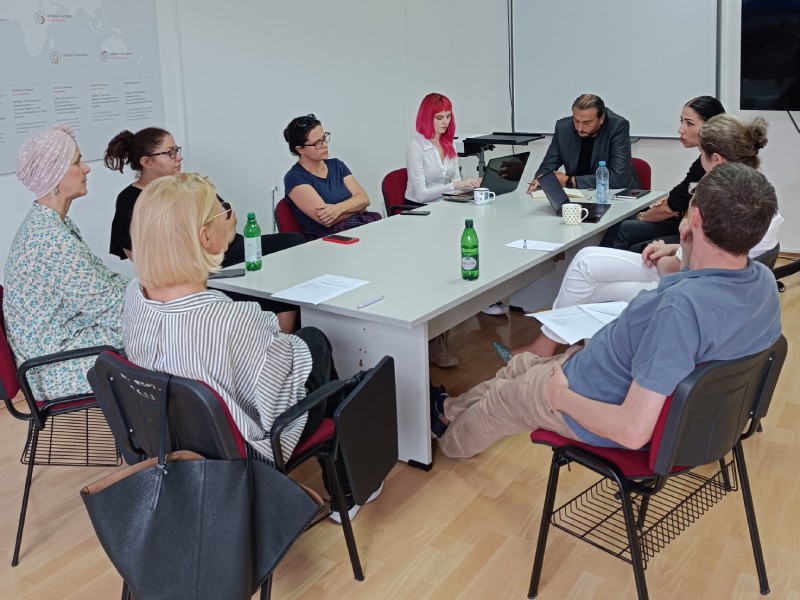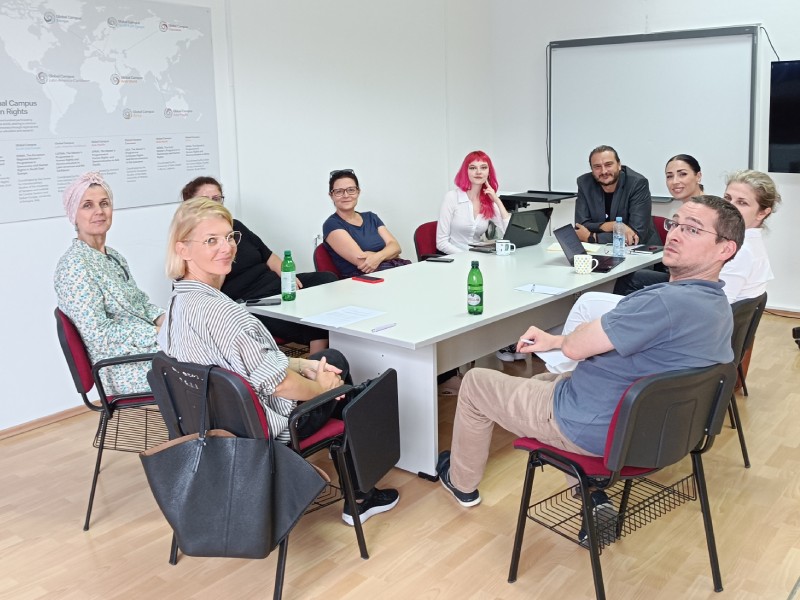On Friday, September 15, 2023, a session of the Gender Equality Council of the University of Sarajevo was held.
There were present: Prof. Jasna Kovačević, PhD; Prof. Zilka Spahić Šiljak, PhD; Lamija Subašić, Ivana Kulić, Gaj Trifković, PhD; Prof. Amila Ždralović, PhD; Miroslav Živanović, MSc.; Prof. Ajla Demiragić, PhD; and Prof. Valida Nikšić, PhD.
The topics discussed were the following ones: UNSA’s Gender Action Plan (GAP) and the need for its updating; Evaluation of educational activities for teaching staff at partner universities of the UNIGEM project; The new UNSA Statute; Education on the prevention of discrimination procedures at universities; Activities for the forthcoming 16 Days of Activism Campaign in 2023, and A new research on menstrual poverty (MenGa) within the UNIGEM project.
– Regarding the GAP, the current UNSA document is valid until the end of this year, so it is necessary to create a new GAP, especially if we know that this document is mandatory in the process of submitting project applications by universities to the EU Horizon Program.
– Regarding the educational activities of the teaching staff, it was pointed out that, according to the data from the online platform, only a small number of teachers responded and took the courses. Therefore, it would be necessary in some way to make official the need for permanent education of university teaching staff in the field of gender equality.
– The new UNSA Statute entered into force and in its articles 93 and 105 regards the Gender Equality Council of UNSA. Article 105 reads:
(1) The Gender Equality Council is an expert and advisory body of the Senate.
(2) The Gender Equality Council serves to:
a) advise the rector and the university community on general issues related to gender equality at the University of Sarajevo,
b) maintain contacts with comparable bodies of other universities and other institutions in the country and the world,
c) organize round tables, debates, scientific conferences on topics related to the application and improvement of gender equality standards at the University,
d) give opinions on the implementation of standards in the field of gender equality adopted by state, intergovernmental and international bodies and authorities,
e) prepare and submit an education plan in the field of gender equality, prepare an annual plan of measures for the progressive realization of gender equality at the University, give an opinion regarding the gender dimension in education, scientific and artistic research work at the University,
f) give an opinion regarding the gender dimension in education, scientific and artistic research work at the University,
g) perform other tasks provided for by law, this Statute and other relevant general acts of the University.
(3) The Gender Equality Council has nine members, one of whom is a representative of the Rector’s Office, six representatives of the Council of Science and Arts Groups proposed by the Councils of Science and Arts Groups and two representatives of the Centre for Human Rights.
(4) The Gender Equality Council elects its president from among its members at the constituent session.
– As part of the UNIGEM project, there will be held a two-day education on the prevention of discriminatory procedures at universities. The education will be held in October 2023, in Sarajevo, and it will be primarily intended for staff from the legal services of partner universities, which participate in the UNIGEM project, and for institutional coordinators. In addition to educating, one of the goals will be good practices’ transfer among 19 partner universities.
– In regard to the 16 Days of Activism Campaign, which starts on November 25, 2023, preparations will be made during the next month, for the reason of ensuring coordination of activities of organizational units of UNSA during the mentioned Campaign. In this way, we will try to optimize the participation of both the student population of UNSA and the teaching staff, so it will not happen several events at UNSA to take place simultaneously. This is a response to last year’s experience and the advice of many people who said that they wanted to attend all the workshops, promotions, etc., organized at UNSA, but they could not make it, because these events often took place at the same time.

– With regard to the new research on menstrual poverty (MenGa), it was presented at the meeting that the TPO foundation will conduct this research within the framework of the UNIGEM project. The target group will be female students of universities in Bosnia and Herzegovina. CPCD will provide financial support for UNSA, while the UNIGEM Project will provide financial support for other universities. The intention is to present the results of this research to decision makers and university management bodies. Also, these results should serve for lobbying for policies on reducing taxes on hygiene necessities.





















